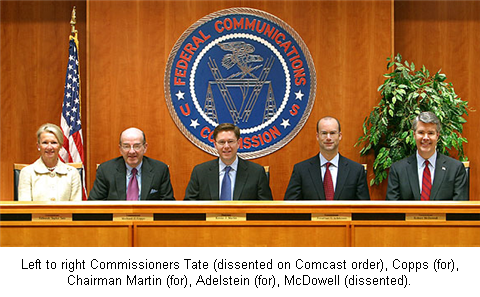FCC slaps Comcast's wrist over network neutrality; Sets precedent

The Federal Communications Commission on Friday ruled 3-2 that Comcast overstepped its network management authority by blocking BitTorrent peer to peer traffic, but stopped short of fining the cable company. The move clarifies the boundaries a bit for other carriers and sends the message that the FCC enforces network neutrality principles.
The order against Comcast is notable because it's the first official one making network throttling blocking officially illegal. The order, which was expected, also sets the template for future actions, which may turn up against other providers. In a nutshell, the FCC issued a cease and desist order to Comcast that forces the cable giant to disclose to customers how it manages its network. One thing is certain: This network neutrality issue will continue to reappear. Indeed the Electronic Frontier Foundation created a software tool to gauge your ISP's neutrality.
FCC Chairman Kevin Martin likened Comcast's behavior--and the Net neutrality issue in general--to the post office. Would it be ok if the post office decided what parcel it moved faster? "Comcast was blocking downloads and doing it 24/7," said Martin. "Today the commission tells Comcast to stop and allow everyone to have unfettered access to the Internet."
The commission affirmed that it can and will enforce an open Internet and network neutrality principles. Martin said that Comcast wasn't merely managing its network. It was blocking specific applications without disclosing it. "Our action today is not about regulating the Internet. Network neutrality rules are unnecessary because the commission already has the tools to enforce (open standards)," said Martin.
Martin said if it didn't take action against Comcast it would set a bad precedent and tell other carriers that blocking is ok. His message: If the FCC didn't take action against Comcast it would indicate that network neutrality laws were needed.
The FCC didn't issue a fine, but Martin said the order is key to create a framework for future actions. "We need to protect consumer access," he said. Martin also said that Comcast's deal with BitTorrent doesn't solve consumer complaints. The only real consensus was that the net neutrality debate will continue.
Vuze, which filed the petition with the FCC along with formal complaints against Comcast, cheered the deal. Vuze CEO Gilles BianRosa said in a statement:
Today’s FCC Order does two important things. First, it makes clear that, while reasonable network management of Internet traffic is permissible, there is a line that cannot be crossed. Comcast crossed that line, and has been sanctioned accordingly. Secondly, the FCC endorsed the idea that the rule of law must be accompanied by transparency into what ISPs are actually doing to our Internet traffic.
FCC commissioners were split on what the meaning of the ruling was in the grand scheme of things and all complained that a ruling crafted in the wee hours of the night didn't provide enough time for analysis. And commissioners noted the order will go through editing. Until Martin's vote, commissioner vote for the Comcast order was split 2-2.
Commissioner Michael Copps hoped that the ruling would set up a fifth FCC principle declaring that all network traffic should be equal. FCC commissioner Jonathan Adelstein said the order illustrates that the FCC can tackle net neutrality issues on a case by case basis without hampering innovation. Both favored an order against Comcast.
But Deborah Taylor Tate, another commissioner, said the Comcast ruling needs to be narrowly focused so that the FCC doesn't hamper innovation. Tate said that network providers are making strides on network neutrality without government interference. Tate's favored approach was to allow the private sector to sort out network neutrality. "My approach was that (Comcast issue) was a review of one complaint and not a monumental decision."
She noted that Comcast has partnered with BitTorrent as the FCC examined the issue. "This mediation is the best way to solve the problem," she said. Commissioner Robert McDowell agreed with Tate. McDowell said the network neutrality issue needs to avoid extremes on both sides.
"The FCC doesn't know what Comcast did or did not do," said McDowell noting that the evidence is conflicting on what Comcast did exactly to BitTorrent. "Not one of us has a networking degree." McDowell's take is that bureaucrats will hamper engineers to effectively manage traffic and potentially slow broadband speeds in the future.
Odds and ends: Sometimes you just can't beat a TV. CSpan carried the FCC meeting live, which was clutch considering that the FCC's live stream croaked.
